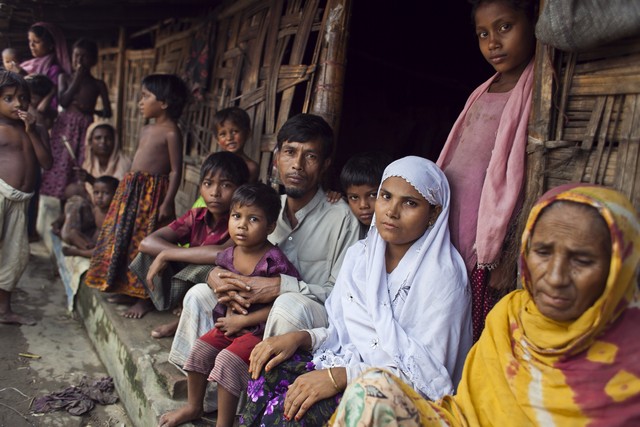By CHANDRA MUZAFFAR
It is commendable that the Malaysian government has undertaken a systematic Search and Rescue (SAR) operation in the Andaman Sea and the Bay of Bengal aimed at saving the lives of thousands of stranded Rohingyas and Bangladeshis. The right to life is the highest human right and all the governments in ASEAN should have committed themselves to this sacred principle at the very outset of the present crisis.
Civil society organizations in the region should also assist in whatever way they can. In this regard, the effort of Malaysian philanthropist, Tan Sri Vincent Tan, is praiseworthy. He was not only among the first to appeal to the Malaysian government to launch a humanitarian mission on behalf of the stranded Rohingyas and Bangladeshis but has also on his own sent aid in the form of medicines, food and water to the Malaysian Navy and the Malaysian Maritime Enforcement Agency (MMEA) to be distributed to the refugees and migrants in rickety boats at sea.
However, to conduct SAR operations without taking other measures to stem the flow of refugees and migrants into the region would not be a wise thing to do. There must also be a robust ASEAN policy implemented immediately with the cooperation of the governments of Myanmar and Bangladesh to destroy people smuggling syndicates in those two countries and in the ASEAN region. Intelligence gathering capabilities should be enhanced to enable the authorities to act against the kingpins in these syndicates before their boats set sail. More important, corruption which is one of the main reasons why human trafficking thrives should be weeded out. Enforcement agencies not only in Myanmar and Bangladesh but also within ASEAN should be purged of corrupt personnel.
If this is done, it would be easier to repatriate Bangladeshi migrants to their country. Unlike the Rohingyas of Myanmar, the vast majority of Bangladeshis appear to be economic migrants escaping poverty at home and hoping to secure decent jobs in Malaysia and other ASEAN countries. It is revealing that about 700 of the 1,100 people given temporary shelter in Langkawi in northern Malaysia in the last two weeks are actually Bangladeshi migrants.
As far as the Rohingyas are concerned, the Malaysian and other ASEAN governments should increase persuasion and pressure upon the Myanmar government to treat these refugees as human beings and citizens. The fetters imposed upon them by the State on various aspects of their lives — their right to employment, to education, to health care, to free movement — should be removed immediately. Most of all, the citizenship of the Rohingya minority which was rescinded by the military junta in power in Myanmar in 1982, should be restored. It is the loss of citizenship which is the root cause of their suffering. It is this that has rendered the Rohingya one of the most persecuted minorities in the world.
It is encouraging that the Foreign Minister of Myanmar in his meeting with his Malaysian counterpart in Naypyitaw ( the capital of Myanmar) yesterday indicated that his government was prepared to cooperate fully with Malaysia in trying to resolve the crisis involving Rakhine state ( the province in Myanmar where the Rohingya live). Other ASEAN governments should also persuade the Myanmar government to address the root cause of the crisis. Indeed other Asian governments such as China, India, Japan and South Korea should also play their role. China in particular with its extensive economic ties with Myanmar — including investments in Rakhine — should make it very clear that it is deeply concerned about the plight of the Rohingya people. It is a pity that it has been rather quiet on this fundamental question of human dignity. The United States and the European Union who had once imposed sanctions upon Myanmar because of its appalling human rights record underscored by the detention of Aung San Suu Kyi should now apply maximum diplomatic pressure upon Myanmar to compel it to accord a modicum of respect to the persecuted Rohingya minority. If the Myanmar government does not respond positively to world opinion, the United Nations should once again focus upon Myanmar and its abysmal treatment of the Rohingya and other minorities.
This is perhaps the right time for the world to act for two reasons. One, the tragedy of thousands of human beings struggling to survive — many have died of starvation — in the open sea has pierced the conscience of humanity as never before at least on the question of the fate of the Rohingyas. Two, there are now influential voices within Myanmar pleading with the government to grant citizenship to the Rohingyas. In a recent media interview, a spokesperson of the National League for Democracy (NLD), the main opposition party in the country, has called upon the government to recognize Rohingyas who have lived in Myanmar for generations as citizens with the same rights as other Myanmar citizens. A leading Buddhist monk, U Pinyasiha, has also asked the government of Thein Sein to resolve the issue of citizenship for the Rohingyas. From the perspective of Buddhist principles, which emphasize saving lives and showing compassion to fellow human beings regardless of religion, it is only right, he has argued, to help the Rohingyas.
Let’s hope that the Myanmar government will now listen and act.
Dr. Chandra Muzaffar is the President of the International Movement for a Just World (JUST).
Malaysia.
22 May 2015.

